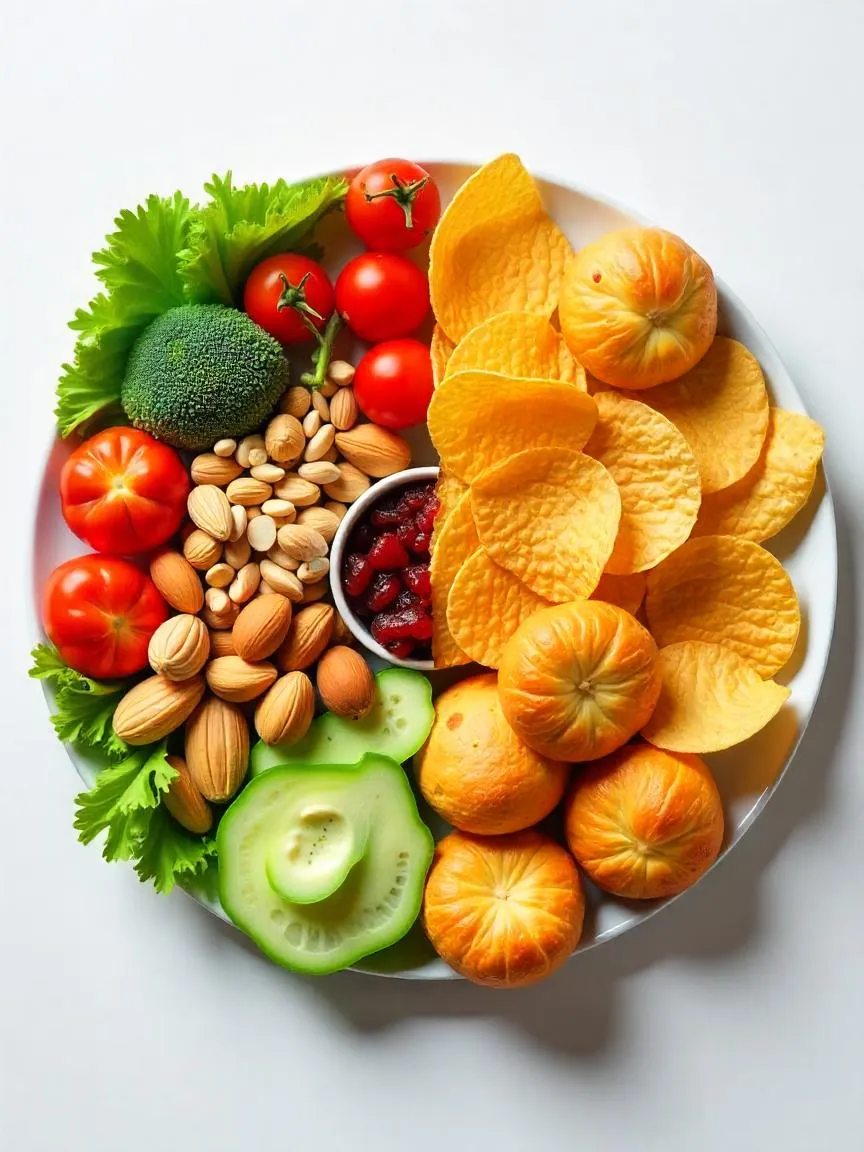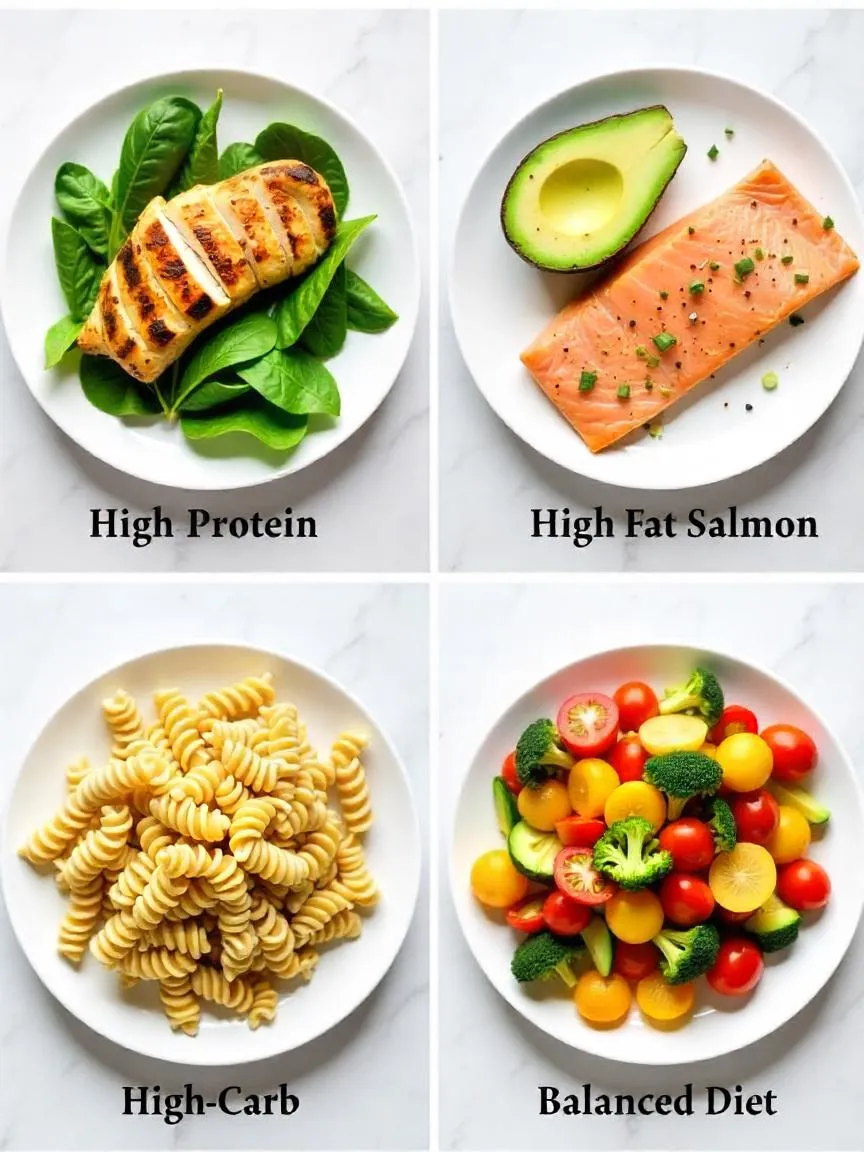Contents
As science continues to deepen our understanding of how food affects health, it’s become clear that not all calories are created equal. While managing calorie intake is an important factor in maintaining a healthy weight, focusing on food quality—what you eat, not just how much—may be even more powerful in preventing chronic disease and supporting sustainable weight management.
Gone are the days of overly simplistic “calories in, calories out” thinking. Emerging research emphasizes that the type of food matters as much—if not more—than the number of calories consumed. The healthiest diets are built on high-quality foods, including whole, minimally processed options, and are eaten in realistic, satisfying portions that align with your lifestyle and goals.
🍽️ Quality Over Quantity
Rather than obsessing over calorie counts or restrictive diet rules, the strongest evidence supports the idea of:
- Choosing whole foods over ultra-processed ones
- Prioritizing healthy fats (like those from nuts, seeds, and olive oil)
- Including fiber-rich carbohydrates, such as vegetables, fruits, and whole grains
- Focusing on lean and plant-based proteins instead of excessive red or processed meats
These changes don’t just promote a healthier weight—they can also lower the risk of heart disease, diabetes, and even certain cancers.
Let’s dive deeper into the components that define a high-quality diet, how they affect metabolism and appetite, and what this means for long-term health.
🍏 Consider Quality, Not Just Calories
The phrase “a calorie is a calorie” is often cited in weight-loss discussions, emphasizing the importance of not overeating. And while managing calorie intake does matter, focusing solely on calorie counts misses a crucial part of the picture.
Why Food Quality Matters
Emerging research shows that not all calories have the same impact on the body. Calories from sugar-sweetened beverages, refined snacks, or fried foods may trigger hunger, spikes in blood sugar, and fat storage—making it easier to gain weight over time. On the other hand, calories from nutrient-rich, high-quality foods can support a feeling of fullness, help regulate appetite hormones, reduce cravings, and even positively influence metabolism.
Rather than obsessing over calorie counts, choose foods based on their quality. This means shifting your focus toward foods that nourish the body and away from those that may promote inflammation, insulin resistance, or weight gain—even if they seem low in calories on paper.
✅ High-Quality Foods
These foods provide beneficial nutrients, fiber, and healthy fats, while being minimally processed:
- Fresh or frozen vegetables and fruits
- Whole grains like brown rice, quinoa, oats
- Healthy fats such as olive oil, nuts, seeds, avocado
- Lean proteins, especially plant-based sources like beans, lentils, tofu, or fish
- Fermented foods (like yogurt or kimchi) for gut health
These are the building blocks of the Healthy Eating Plate—a visual guide to creating balanced, nutrient-rich meals.
❌ Lower-Quality Foods
These are typically heavily processed and lack nutritional value, while being high in sugar, unhealthy fats, and refined starches:
- Sugar-sweetened beverages (soda, sweetened coffee drinks, energy drinks)
- Refined grains (white bread, white rice, pastries)
- Fried and fast foods
- Processed meats (sausages, bacon, deli meats)
- Foods high in saturated fats and trans fats
- High-glycemic foods like white potatoes or overly sweetened cereals
These foods often lead to rapid blood sugar swings, poor satiety, and metabolic disruptions that can promote overeating and weight gain.
🧬 One Diet Doesn’t Fit All
It’s important to note that there is no single perfect diet. Individual factors—such as genetics, culture, physical activity, health status, and personal preferences—should all influence what works best for you. The key is to find a pattern of eating that emphasizes quality foods, is sustainable long-term, and supports your personal health goals.
📊 Quality Counts: What the Research Shows
Is it just about calories? Or do the types of foods we eat have their own impact on weight? A landmark study led by researchers from the Harvard T.H. Chan School of Public Health tackled this question—and the answer is clear: food quality matters.
🍟 Some Foods Promote Weight Gain
In this large-scale study of over 120,000 healthy women and men followed for up to 20 years, researchers examined how specific foods influenced long-term weight changes. The results showed that certain foods were consistently associated with greater weight gain:
- Potato chips
- Potatoes (especially fried or in large quantities)
- Sugar-sweetened beverages
- Processed and unprocessed red meats
These foods are typically high in refined starches, added sugars, and unhealthy fats, which may lead to greater calorie intake, less satiety, and more fat storage—even if you’re not eating “too many” calories on paper.
🥦 Other Foods Help Prevent Weight Gain
On the flip side, certain high-quality, nutrient-dense foods were linked with weight loss or weight stability, even without intentional calorie restriction:
- Vegetables
- Whole grains
- Fruits
- Nuts
- Yogurt
These foods tend to be rich in fiber, protein, and healthy fats, which support satiety, improve metabolism, and help regulate appetite and blood sugar levels.
🔑 Calories Still Matter—But Quality Guides Quantity
Importantly, the researchers didn’t dismiss the role of calories altogether. Instead, they highlighted that eating high-quality foods naturally leads to lower overall calorie intake by increasing fullness and reducing cravings. In other words, quality influences quantity—and not all calories have the same effect on your body or your hunger signals.
🥩🥖🥑 Managing Macronutrients: Does It Matter?
With the rise of macronutrient-focused diets over the past few decades—think low-fat, low-carb, keto, paleo—the way we talk about nutrition has shifted. Rather than just counting calories, more people now focus on the balance of the three main macronutrients:
- Carbohydrates
- Proteins
- Fats
But is one macronutrient distribution clearly better than another for weight loss? Research suggests the answer is… not so simple.
🧪 Comparing Diets: The JAMA Study
A 2007 study published in JAMA compared four popular diets, each with a different macronutrient emphasis:
- Atkins: Very low-carb, high-fat and protein
- Zone: Low-carb, balanced protein and fat
- LEARN: Higher-carb, based on U.S. dietary guidelines
- Ornish: Very high-carb, low-fat vegetarian approach
Over 300 overweight and obese premenopausal women followed their assigned diet for 12 months.
📉 Results After One Year
- Women in the Atkins (low-carb) group experienced greater weight loss than those in the other three groups.
- Metabolic markers (including blood pressure, cholesterol, glucose, and body fat percentage) were either comparable or slightly better for the Atkins group.
- No significant differences in weight loss were observed among the Zone, LEARN, and Ornish groups.
🧠 What This Means
This study suggests that a low-carbohydrate, higher-protein and fat diet like Atkins may be a viable strategy for weight loss, at least in the short term. However, long-term effects and sustainability are still open questions.
It also highlights an important reality: no one-size-fits-all approach exists. Factors such as genetics, medical history, lifestyle, and food preferences all play a role in how effective a diet will be for an individual.
⚖️ Macronutrients & Weight Loss: What the Science Says
When it comes to weight loss, is it really about carbs vs. fats? Or is the truth more nuanced?
🧪 Study #1: NEJM 2009 — It’s Not Just About the Macros
In a landmark study published in The New England Journal of Medicine (2009), researchers tracked 800 adults over two years, assigning them to one of four diets:
- Low-fat, average-protein
- Low-fat, high-protein
- High-fat, average-protein
- High-fat, high-protein
Findings:
- All four groups experienced meaningful weight loss.
- Macronutrient composition didn’t significantly affect results.
- Group counseling sessions made a big difference—those who attended more lost more weight and regained less.
✅ Key Takeaway: What you eat is important—but how you eat, and the support you get, matter too.
🥩 Study #2: NEJM 2010 — Protein and Glycemic Index Help Keep Weight Off
Another NEJM study in 2010 explored how diet quality affects weight loss maintenance. Nearly 800 overweight Europeans lost 8% of their body weight on a low-calorie diet and were then assigned one of five maintenance diets:
- Low-protein, low-GI
- Low-protein, high-GI
- High-protein, low-GI
- High-protein, high-GI
- Control diet
Findings:
- The low-protein, high-GI group regained the most weight.
- Diets higher in protein and lower in glycemic index (GI) helped people maintain weight loss better.
✅ Key Takeaway: A modest boost in protein and reducing high-GI foods (like white bread, sugary cereals) can help you keep weight off.
🌱 So, What’s the Best Diet?
These and earlier studies suggest that:
- Macronutrient-focused diets (like low-carb or high-protein) can work, but may not be right for everyone.
- Your genes, lifestyle, and preferences affect how your body responds to any given diet.
- There is no single “best” diet—but there are best practices.
🎯 The Healthy Eating Plate remains a trusted framework:
- Fill half your plate with vegetables and fruits
- Prioritize whole grains, healthy fats, and quality proteins
- Limit added sugar and ultra-processed foods
✅ Bottom line: Choose nutrient-dense, whole foods, eat mindfully, and find a pattern that fits your life—not just a trend.










